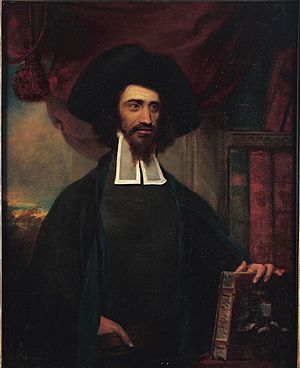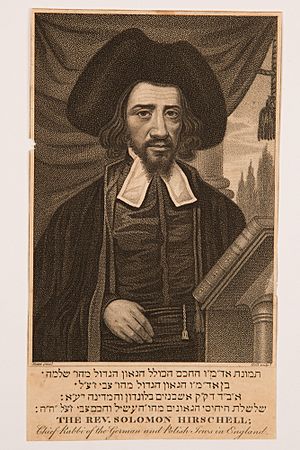Solomon Hirschell facts for kids
Rabbi Solomon Hirschell (born February 12, 1762, in London; died October 31, 1842, in London) was a very important religious leader. He served as the Chief Rabbi of Great Britain from 1802 to 1842. He is mostly remembered for trying to stop a new movement called Reform Judaism from growing in Britain. He tried to do this by removing its leaders from the Jewish community, but he was not successful.
His name can also be spelled Hirschel or Herschell.
Contents
Early Life and Family
Solomon Hirschell was born in London. His father was Hirschel Levin, a Polish Jew from a region called Galicia. His father was also a Chief Rabbi, serving in London and Berlin. He was even a friend of the famous philosopher Moses Mendelssohn. Solomon Hirschell's older brother was a respected scholar named Saul Berlin.
His Role as Chief Rabbi
As Chief Rabbi, Solomon Hirschell was the main religious authority for the Jewish community in Great Britain. This was a very important position. He worked to guide the community and uphold Jewish traditions.
Challenges and Reform Judaism
During his time, a new way of practicing Judaism, called Reform Judaism, began to spread. This movement wanted to make some changes to traditional Jewish practices. Rabbi Hirschell strongly believed in keeping the old ways. He tried to stop Reform Judaism from growing by using a religious act called "excommunication." This meant he declared that the leaders of the Reform movement were no longer part of the Jewish community. However, his efforts did not stop the movement from continuing to grow in Britain.
Later Life and Legacy
Rabbi Solomon Hirschell passed away on October 31, 1842. This date is also known as the 27th of Cheshvan in the Jewish calendar (5603). He was buried in the Brady Street Cemetery. This cemetery is located near Whitechapel in the East End of London. His time as Chief Rabbi was a period of significant change for the Jewish community in Britain.
 | Georgia Louise Harris Brown |
 | Julian Abele |
 | Norma Merrick Sklarek |
 | William Sidney Pittman |



